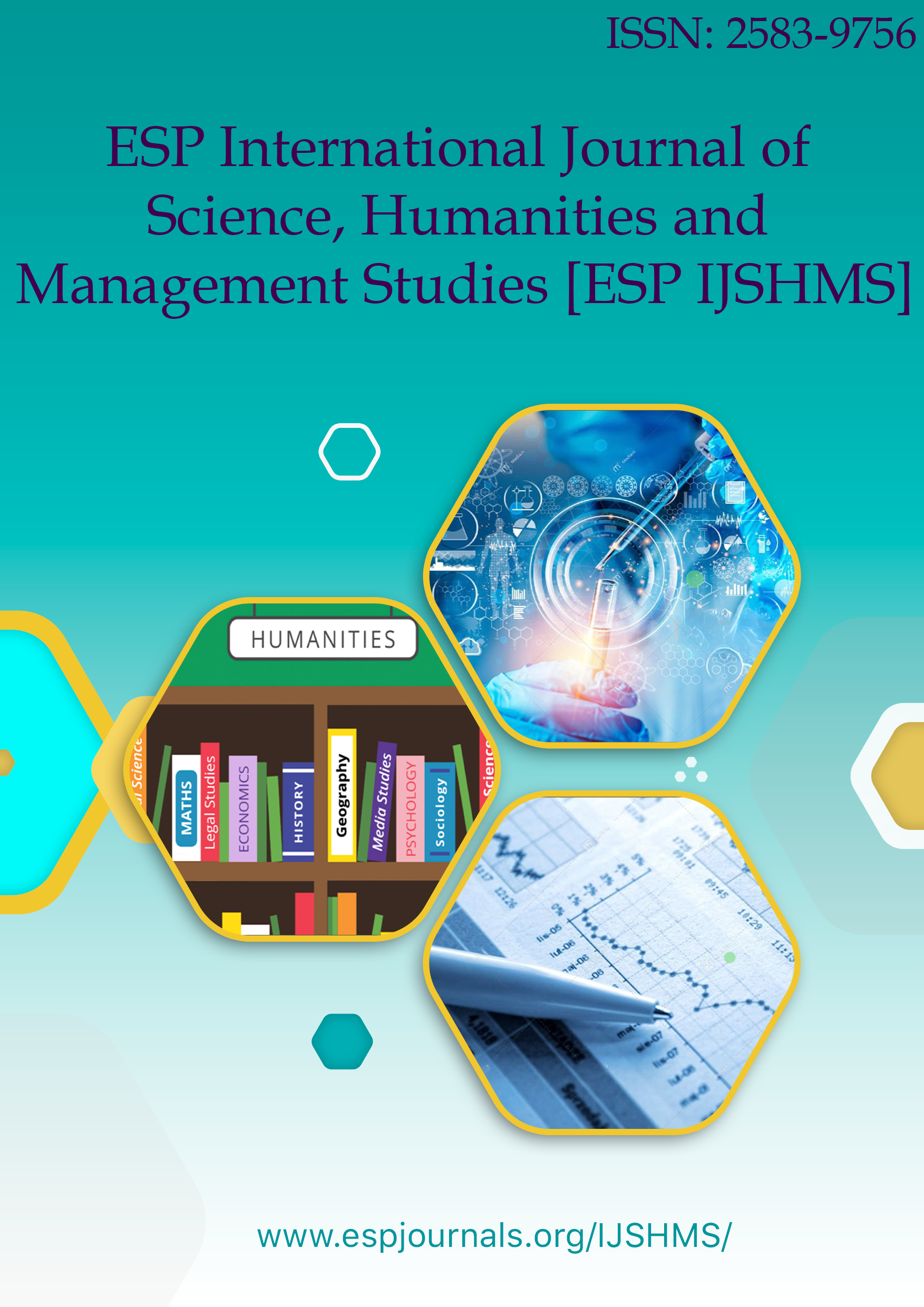ESP International Journal of Science, Humanities & Management Studies (ESP-IJSHMS)
Citation :
Donna T. Hobbs, 2024. "A Contemporary Understanding of Divine Illumination as a Source of Knowledge" ESP International Journal of Science, Humanities & Management Studies (ESP-IJSHMS) Volume 2, Issue 3 : 15-24
.Abstract :
This paper examines the evolution of epistemology, the process for understanding the source of cognitive data, by contrasting theological, existential, and phenomenological approaches to synthesis. Data is not just an integral variable for obtaining knowledge but also becomes the raw material for individual understanding of reality. Starting with the Ancient Greek philosophers, Socrates, Plato and Aristotle, this timeline covers almost 1800 years, 470 B.C. to A.D. 1308. My objective is to connect the Greek philosophies regarding the source of knowledge to the Christian theologies of Saint Augustine, Saint Anselm, Saint Bonaventure, Saint Thomas Aquinas, and Saint John Duns Scotus. The transition of the Roman Republic to the Roman Empire, the advent of Christianity, the fall of the Western Roman Empire, the subsequent reconstruction of the Holy Roman Empire, and the discord between the Western Latin Church and the Eastern Greek Church provide the context in which the evolution of epistemology is considered.
References :
[1] Brown, P. (2000). Augustine of Hippo: A Biography. University of California Press.
[2] Chadwick, H. (1991). Introduction. In Augustine, Confessions (pp. i-xxvi). Oxford University Press. (Original work published between 397 and 400).
[3] Chenu, M.-D. (2020, April 27). St. Thomas Aquinas. In Encyclopedia Britannica. https://www.britannica.com/biography/Saint-Thomas-Aquinas.
[4] Classical Antiquity. (2020, November 9). In Wikipedia. https://en.wikipedia.org/wiki/Classical_antiquity.
[5] Concordat of Worms. (2015, November 8). In Encyclopedia Britannica. https://www.britannica.com/event/Concordat-of-Worms.
[6] Constantine the Great. (2020, November 28). In Wikipedia. https://en.wikipedia.org/wiki/Constantine_the_Great
[7] Conversion of St. Augustine. (n.d.). Midwest Augustinians. https://www.midwestaugustinians.org/conversion-of-st-augustine.
[8] Copleston, F. C. (2003). A History of Philosophy. Continuum.
[9] Crisis of the Third Century. (2020, December 2). In Wikipedia. https://en.wikipedia.org/wiki/Crisis_of_the_Third_Century.
[10] East-West Schism. (2019, April 4). In Encyclopedia Britannica. https://www.britannica.com/event/East-West-Schism-1054
[11] Edict of Milan. (2020, November 11). In Wikipedia. https://en.wikipedia.org/wiki/Edict_of_Milan
[12] Edict of Thessalonica. (2020, November 30). In Wikipedia. https://en.wikipedia.org/wiki/Edict_of_Thessalonica
[13] Fall of the Western Roman Empire. (2020, November 24). In Wikipedia. https://en.wikipedia.org/wiki/Fall_of_the_Western_Roman_Empire
[14] Feser, E. (2019). Aquinas: A Beginner's Guide. Oneworld.
[15] Grube, J.M. (2002). Introduction. In Plato, Five Dialogues: Eutyphro, Apology, Crito, Meno, Phaedo (pp. ix-x). Hackett.
[16] Lexico Dictionaries. (2020, September 16). Dialectic: Definition of Dialectic by Oxford Dictionary on Lexico.com. In Lexico Dictionaries | English. https://www.lexico.com/definition/dialectic.
[17] Manichaeism. (2020, November 29). In Wikipedia. https://en.wikipedia.org/wiki/Manichaeism.
[18] McInerny, R., & O'Callaghan, J. (2014, May 23). Saint Thomas Aquinas. In Stanford Encyclopedia of Philosophy. https://plato.stanford.edu/entries/aquinas/.
[19] Nails, D. (2018, February 6). Socrates. In Stanford Encyclopedia of Philosophy. https://plato.stanford.edu/entries/socrates/.
[20] Nash, R. H. (2003). The Light of the Mind: St. Augustine's Theory of Knowledge. University Press of Kentucky.
[21] The New American Bible - IntraText. (2002, November 11). http://www.vatican.va/archive/ENG0839/__PXD.HTM.
[22] Noone, T., & Houser, R. E. (2020, December 1). Saint Bonaventure. In Stanford Encyclopedia of Philosophy. https://plato.stanford.edu./entries/bonaventure/.
[23] Pasnau, R. (2020, February 10). Divine Illumination. In Stanford Encyclopedia of Philosophy. https://plato.stanford.edu/archives/spr2020/entries/illumination/.
[24] Persecution of Christians. (2020, November 27). In Wikipedia. https://en.wikipedia.org/wiki/Persecution_of_Christians?wprov=sfti1.
[25] Pieper, J. (2019, August 14). Scholasticism. In Encyclopedia Britannica. https://www.britannica.com/topic/Scholasticism.
[26] Plato. (2002). Five Dialogues: Eutyphro, Apology, Crito, Meno, Phaedo. (G. M. A. Grube, Trans., J. M. Cooper, Ed.). Hackett.
[27] Robinson, P. (1907). St. Bonaventure. In The Catholic Encyclopedia. New York: Robert Appleton Company. http://www.newadvent.org/cathen/02648c.htm
[28] Roman Empire. (2020, November 21). In Wikipedia. https://en.wikipedia.org/wiki/Roman_Empire.
[29] Schumacher, L. (2011). Divine Illumination: The History and Future of Augustine's Theory of Knowledge. Wiley-Blackwell.
[30] Tornau, C. (2019, September 25). Saint Augustine. In Stanford Encyclopedia of Philosophy. https://plato.stanford.edu/entries/augustine/.
[31] Vollert, C. (2002). Translator’s Preface. In Aquinas, T. Aquinas's Shorter Summa: St. Thomas Aquinas's Own Concise Version of His Summa Theologica (pp. xi-xvi). Sophia Institute Press.
[32] Williams, T. (2015, May 21). Saint Anselm. In Stanford Encyclopedia of Philosophy. https://plato.stanford.edu/archives/spr2016/entries/anselm/.
[33] Williams, T. (2019, October 11). John Duns Scotus. In Stanford Encyclopedia of Philosophy. https://plato.stanford.edu/entries/duns-scotus/.
[34] Wolter, A. B. (2020, November 4). Blessed John Duns Scotus. In Encyclopedia Britannica. https://www.britannica.com/biography/Blessed-John-Duns-Scotus.
Keywords :
Evolution of Epistemology, Phenomenological Approaches, Divine Illumination, Source of Knowledge.


